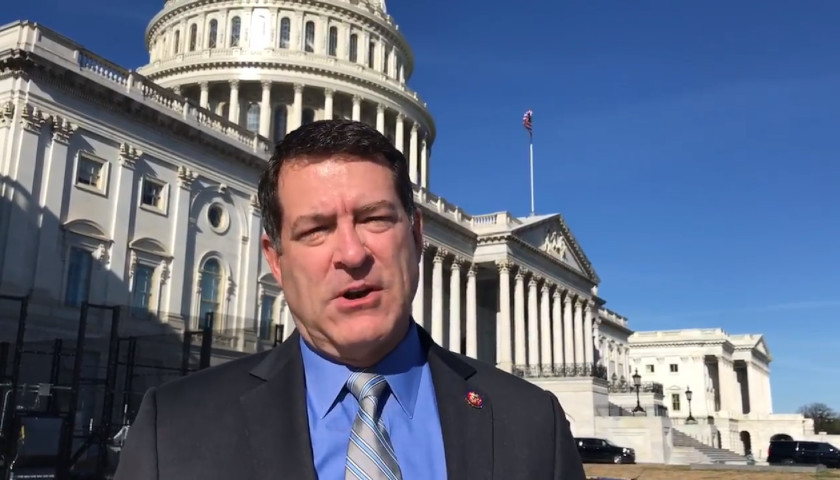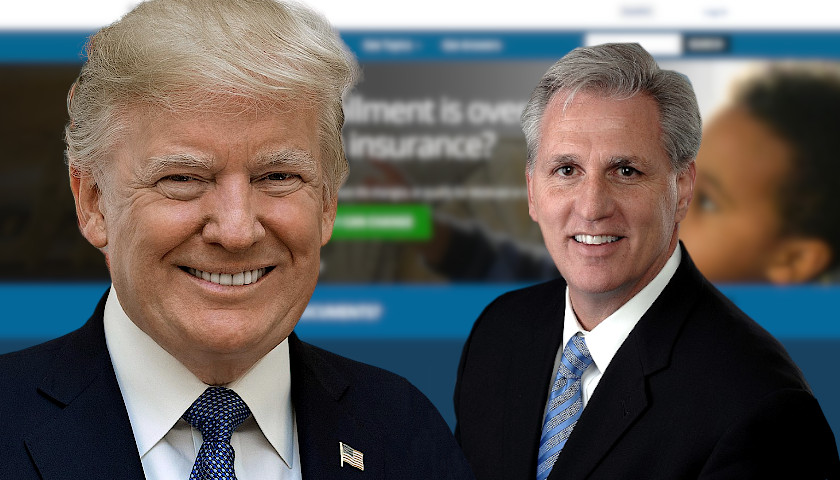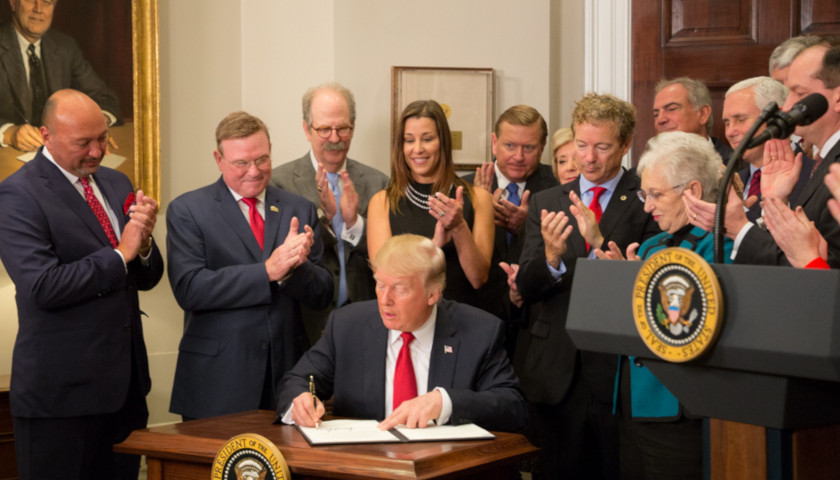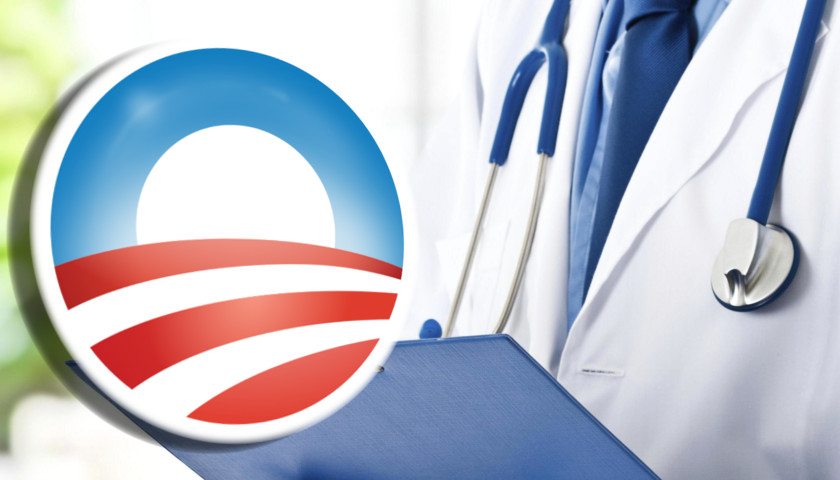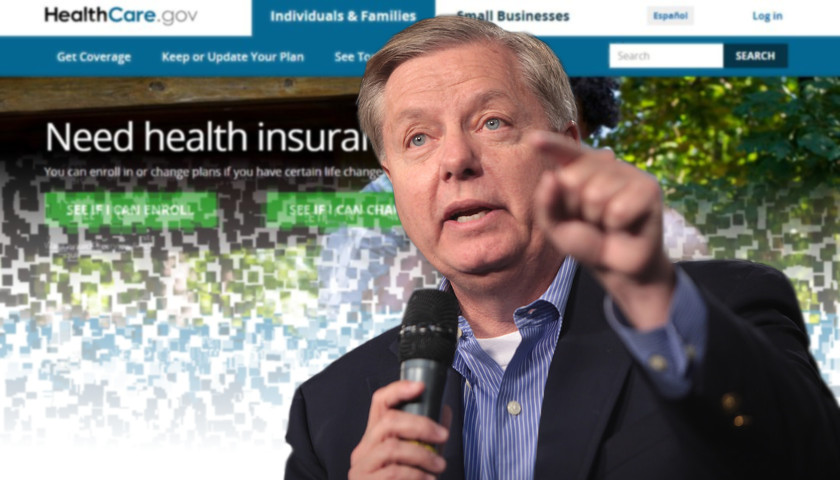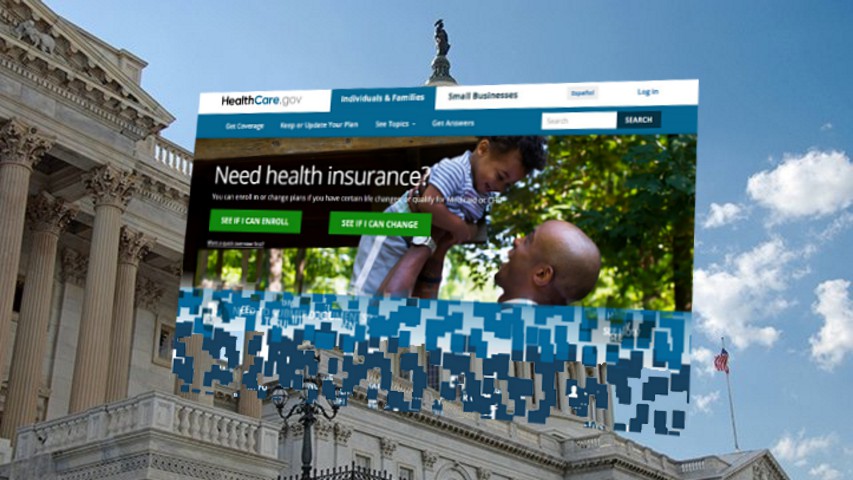U.S. Rep. Dr. Rep. Mark Green (R-TN-07) on Tuesday introduced a bill to give Medicaid recipients more choice and power in their healthcare decisions. The Medicaid Improvement and State Flexibility Act would authorize states to begin pilot programs giving Medicaid recipients a “swipe card” with dollars on it designated for medical purchases, Green said in a press release. What is not spent from the card is returned to the holder at year’s end in the form of an Earned Income Tax Credit. Coupled with a catastrophic insurance plan, this ensures Medicaid recipients a safety net while at the same time introducing competition into the healthcare market that will improve the quality of care and drive down costs, the congressman said. “The Republican solution to our country’s healthcare crisis is more choice and better care,” Green said. “We need to move forward and utilize the power of markets to fix our broken system and help those in need. I hope Congressional leaders on both sides of the aisle recognize the need for patient choice and join this effort.” Green introduced his bill as House Democrats are promoting legislation to protect parts of the Affordable Care Act and lower prescription drug…
Read the full storyTag: Affordable Healthcare Act
Top House Republican Breaks From Trump Administration on Latest Obamacare Move: Report
by Evie Fordham House Minority Leader Kevin McCarthy is not behind the Trump administration’s latest move to overturn the Affordable Care Act (ACA), according to a report from Axios. President Donald Trump’s Justice Department concurred Monday with a federal judge’s determination that the framework of the ACA, also known as Obamacare, is unconstitutional. McCarthy told Trump during a phone call that the decision to focus on health care and fighting the ACA did not make sense, according to two sources familiar with the conversation cited by Axios. The top House Republican brought up the 2018 midterm elections, during which many Democratic candidates appealed to voters more than Republicans with their stances on how to provide health coverage to people with pre-existing conditions. Trump upped the ante Wednesday when he told reporters in the Oval Office that “we’ll have a plan that is far better than Obamacare” if the ACA is overturned. McCarthy had declined to comment on the Trump administration’s latest ACA move, which could be the first step in a journey to the Supreme Court that would help Trump fulfill his campaign promise to get rid of the ACA. “Just call the office and we’ll follow back to…
Read the full storyNorth Carolina Treasurer Warns of Health Plan Insolvency, Has Plans for Reform
A December 2018 report by S&P Global suggests that the North Carolina state health plan will be in real jeopardy of insolvency by 2023 due to unfunded liabilities and rising medical and pharmaceutical costs. “North Carolina’s other post-employment benefit (OPEB) liabilities as a combined funded ratio, are less than five percent funded. The November 28, 2018 report confirms previous research by the Pew Charitable Trusts which explains that the state’s unfunded retirement/health care costs as a share of personal income are one of the worst in the country, right behind Illinois,” State Treasurer Dale R. Folwell, CPA, announced in a press statement about S&P Global’s findings. “Every man, woman, and child in the state would have to pay almost $3,200 each to cover our current promises of health care for state and local government retirees. We’re having to act because others haven’t,” Folwell said in the press statement. Folwell has a plan to save the health plan and taxpayer money. “We are approaching this like anything else and that’s ‘we attack problems, not people’, Folwell recently told Battleground State News. “Solving this is going to make a huge difference in the lives of the people who educate our kids, who…
Read the full storyNorth Carolina Treasurer Warns of Health Plan Insolvency, Has Plans for Reform
A December 2018 report by S&P Global suggests that the North Carolina state health plan will be in real jeopardy of insolvency by 2023 due to unfunded liabilities and rising medical and pharmaceutical costs. “North Carolina’s other post-employment benefit (OPEB) liabilities as a combined funded ratio, are less than five percent funded. The November 28, 2018 report confirms previous research by the Pew Charitable Trusts which explains that the state’s unfunded retirement/health care costs as a share of personal income are one of the worst in the country, right behind Illinois,” State Treasurer Dale R. Folwell, CPA, announced in a press statement about S&P Global’s findings. “Every man, woman, and child in the state would have to pay almost $3,200 each to cover our current promises of health care for state and local government retirees. We’re having to act because others haven’t,” Folwell said in the press statement. Folwell has a plan to save the health plan and taxpayer money. “We are approaching this like anything else and that’s ‘we attack problems, not people’, Folwell recently told Battleground State News. “Solving this is going to make a huge difference in the lives of the people who educate our kids, who…
Read the full storyStates Have a New Opportunity to Lower Health Insurance Premiums and Expand Options
by Mary Fishpaw The Trump administration is offering welcome relief to Americans struggling with high premiums under Obamacare premiums and a lack of insurance choices. The administration has taken a series of regulatory actions to do the following: Make short-term, limited duration policies widely available and give consumers the right to renew those policies. Make it easier for small businesses and independent contractors to band together for greater insurance purchasing power. Propose to allow employers to contribute to tax-advantaged accounts, which their workers could then use to purchase portable insurance coverage. The Department of Health and Human Services also has made it easier for states to promote more affordable, flexible insurance coverage options by obtaining waivers from restrictive Obamacare regulations. These “State Empowerment and Relief Waivers” enable states to tap money that the federal government would have paid directly to insurance companies in the form of premium subsidies. States could repurpose this money to design and implement their own premium assistance programs. Such programs could distribute subsidies through defined contributions to consumer-directed accounts established for low-income individuals. States also could provide premium subsidies for insurance policies that don’t conform to Obamacare’s rigid requirements. States that obtain these waivers would…
Read the full storyCommentary: Tennessee’s ObamaCare Fiasco Shows the Perils of Short Term Plans
By Peter Moorman On August 1, the departments of Health and Human Services, Labor, and the Treasury released a final ruling on the expanded use of STLDI plans (Short Term, Limited Duration Insurance). Prior to this ruling, short-term insurance plans lasted a maximum of three months before individuals had to sign up for longer-term plans through the ACA “ObamaCare” exchanges. The new ruling issued last Wednesday allows short-term plans to last for up to 364 days, and, with any potential extensions, up to 36 months in total. The rule change is a step in the right direction since it creates more options for health insurance, but it doesn’t go far enough. The Trump solution is a win for more state control of healthcare. It will be important, however, to empower consumers rather than putting too much power in government bureaucracies. According to the new ruling, state insurance commissioners are free to restrict the duration of the short-term plans as they see fit. Last Wednesday’s ruling – set to go into effect on September 30 – sets up the short-term health insurance policies to be sold differently state-by-state. This will most likely create more health insurance options for those living in…
Read the full storyPresident Trump Faces Institutional Obstacles to Overcome U.S. Drug Pricing Fiasco
President Trump is scheduled to deliver his first speech Friday to introduce an overarching plan to confront high drug prices. As a candidate, where he railed against the pharmaceutical industry and accused it of “getting away with murder.” The populist rhetoric appears to be giving way to a more nuanced strategy focused on making the pharmaceutical market more open and competitive, with the aim of lowering costs for consumers. It’s an approach that could avoid a direct confrontation with the powerful pharmaceutical lobby, but it could also underwhelm Americans seeking relief from escalating prescription costs. Administration officials previewing the speech Thursday touted it as the most comprehensive plan to tackle prescription drug costs that any president has ever proposed, but offered few specifics. Officials said the plan would increase competition, create incentives for drugmakers to lower initial prices and slash federal rules that make it harder for private insurers to negotiate lower prices. The result would be lower pharmacy costs for patients — a key Trump campaign promise. The plan will not include giving the federal Medicare program power to directly negotiate prices with drugmakers, they noted. Trump campaigned on the idea, which is vigorously opposed by the pharmaceutical industry. Public outrage…
Read the full storyReport: Obamacare Made Insurance Companies Stock Prices Soar ‘272 Percent’
Obamacare’s Medicaid expansion program and subsidies have made major health insurance companies extremely profitable, according to a White House economic report released Wednesday morning. The White House Council of Economic Advisors (CEA) report that insurers’ financial health, a measure the group says is reflected in their stock prices, improved markedly after Obamacare took full effect Jan.…
Read the full storyLindsey Graham, South Carolina Senator: We’ll Get the Votes for Obamacare Repeal Bill
Sen. Lindsey Graham says he thinks the votes will be there to pass Obamacare repeal legislation he’s introduced with Sen. Bill Cassidy of Louisiana, saying they’re trying to devolve money and power out of Washington and return it to the states. “I think we’re going to get the votes,” the South Carolina Republican said in an…
Read the full storyCommentary: Four Steps President Trump Can Take to Quicken Obamacare Implosion
With the wee-hours even a modest partial repeal of Obamacare in the Senate, the ball now moves to the executive branch. President Donald Trump’s administration has considerable power to improve the health care system within the confines of the Affordable Care Act — or make mischief and hasten its demise. The president tweeted in the early-morning…
Read the full storyLetter to the Editor: With Obamacare, There Is Nothing Left to Repair
Dear Tennessee Star, There are a lot of people calling, writing and visiting our two Senators, urging them to vote against the American Health Care Act and instead, repair the Affordable Care Act (aka Obamacare). I have news for these folks: There is nothing left to repair. I know it must be frustrating to see that the hallmark Democratic achievement of the last eight years has, as we predicted, collapsed under its own weight. More and more insurers are leaving the health care exchanges: in fact, of the 95 counties in Tennessee, 47 – over half – will have NO INSURER left beginning next year. Nearly two million Americans have dropped their Obamacare coverage so far this year. Is it not bad enough to pay taxes and penalties for refusing to buy health insurance you can’t use? Do you remember the promise that premiums for the average family would decrease by $2,500 a year? In reality, premiums for many families have doubled (or more) and are expected to increase dramatically again in the next year. Clearly, the Affordable Care Act is neither affordable, nor does it provide care. The government, and insurance companies, need to get out of the…
Read the full story
